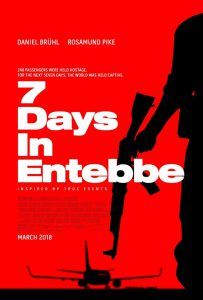The movie
This weekend saw the UK premiere of the new movie “7 Days in Entebbe,” a historical drama about the famous hijacking and rescue.
Though we haven’t seen the film yet, according to initial reviews, it is especially sympathetic toward the  terrorists. Indeed, we seem to live in an age of moral relativism, historical revisionism, and just plain (and in my opinion inexplicable) sympathy toward some of the world’s most obvious bad actors.
terrorists. Indeed, we seem to live in an age of moral relativism, historical revisionism, and just plain (and in my opinion inexplicable) sympathy toward some of the world’s most obvious bad actors.
So it seemed a fitting time to do an HonestReporting book review on the topic.
In his book “Yoni’s Last Battle,” author Iddo Netanyahu recounts the story of terrorists who specifically targeted Jews because they were Jewish: barely three decades after the end of the Holocaust, and the enormous risks Israel took took to save them.
At a time when much of the world is in love with “humanizing” history’s villains, Iddo reminds us of the oft forgotten humanity of the hostages and their rescuers: not as soldiers or victims, but as people.
The event
In 1976, Palestinian and German terrorists hijacked a plane en route to Israel and, with the aid of the Ugandan army, held over 100 passengers hostage at the airport in Entebbe, Uganda. The terrorists specifically held Israelis as well as any other passengers who visibly appeared to be Jewish, and released the others. (Captain Michel Bacos and the crew of the hijacked Air France Airbus refused to abandon the hostages, and remained in capture as well). On July 4, Israel did what was thought to be the impossible: flew over 2,000 miles to Uganda, freed the hostages, and brought them to safety in Israel.
Yoni, Iddo and the book
Only one Israeli soldier died in “Operation Thunderbolt”: its commander Yoni Netanyahu.
Yoni’s brother, Iddo Netanyahu, painstakingly acquired firsthand accounts, which he compiled into this book, “Yoni’s Last Battle.” (Yoni’s other brother, Benjamin Netanyahu, is now Israel’s Prime Minister.)
Based on personal stories from those who knew Yoni closely, the book gives the reader a sensation of really “being there,” from the initial planning stages, through the chaotic politics of approving the mission, and finally to its dramatic execution.
Sayeret Matkal

Known as “the Unit,” Sayaret Matkal is the legendary, and secretive, special forces unit within the Israel Defense Forces that was tasked with Operation Thunderbolt. This book brings the reader inside: inside the training bases, the command structure, even the politics of decision making.
We begin with the news of the hijacking, the planning stages of a possible operation on limited intelligence, even the tools the soldiers used to create a viable training system: including the use of tent fabric to create simple mock-ups of the Entebbe airport terminal. Flashbacks show us the story of Yoni’s rise to become commander of the Unit as well as formative experiences from his childhood.
Join the fight for Israel’s fair coverage in the news
Support
Israel’s air force, the central hero of innumerable books and films, takes a supporting role in Iddo’s story telling. This will be an interesting departure for most Israel history buffs, and a meaningful reminder that the IDF is a cooperative effort: more than any one unit or soldier.
The IAF (Israeli Air Force) was tasked with carrying out a near-impossible clandestine landing in hostile territory, with limited resources and planes nearly overloaded with soldiers and vehicles. The pilots had to fly not only an unprecedented distance from Israel while remaining entirely undetected, but they had to be prepared for the possibility of landing in pitch dark, using a top secret system based on radar visualization. (The dark landing was not necessary in the end, but that was not known until the last moment.)
The Golani brigade played a critical role in providing fire support: essentially tasked with holding off the entire Ugandan army, if necessary, while the paratroopers unit was responsible for securing the civilian air terminal and other tasks.
Other units played critical roles as well: combat medical teams that had to be prepared for the possibility of treating soldiers and civilians while under fire, logistics teams that had to operate rapidly and in secrecy, even an automotive team that prepared the famous limousine the Unit used as a ruse to move its soldiers close to the airport undetected. (The only vehicle the IDF could obtain on such short notice was the wrong color and had a faulty motor, either of which could prove deadly, and had to be corrected on a near impossible timeframe.)
Of course, the main focus of the story is the Unit: which made the first rapid and meticulously planned assault, killing or disabling all hostile forces in the immediate area before any could kill the hostages.
The story behind the story
Each known element of Operation Thunderbolt was the result of significant, often unknown preparation. Iddo takes the reader on a tour of the process: developing creative solutions, practicing and testing, even convincing the various levels of command and government of the viability of each element. The reader comes away with a depth of understanding that is rare in warfare history literature.
Most surprising to me was the revelation that until the very last moment, most involved assumed that the mission would not actually be approved, and that they were preparing for what would prove a purely theoretical exercise.
As expected, Iddo delves into the psychology behind Yoni the person: what drove him, his thought and command style, even hints as to the self sacrificing qualities that may have contributed to his death. We see not only inside the operation, but inside the thoughts of its commander, at least insofar as Iddo can surmise.
The significance
It cannot be over emphasized how unusual and important this operation was. In 1976 Israel was considered, at best, a regional power, and a vulnerable one at that. Most of the world (including most Israelis) thought it inconceivable that Israel might operate so far from home.
A failed mission would have cemented the notion of Israel as a limited, local power: placing its citizens in even greater danger of more such attacks. The success of Operation Thunderbolt established a new perception of Israel as, if not a true global power, at least as a power capable of protecting its citizens and interests anywhere on Earth.
Not only the personal dangers, but also the historic and national risks, weighed on the minds of every participant in this story.
Operation Yoni
Operation Thunderbolt came to be re-named Operation Yoni, in honor of its commander and the only IDF soldier who died in the operation, though Iddo does not forget that paratrooper Surin Hershko was left paralyzed.
Iddo is, not surprisingly, partial toward his brother, who is after all, the hero of this book. He portrays Yoni as a bit of a paradox: the soldier-intellectual, a fan of literature and learning, yet also an unusually talented commander. Iddo credits Yoni with much of the success of the entire mission.
Yet there were other opinions too: competition, jealousy, even straightforward objections to his style and approach. Iddo allows the reader to glimpse all of this. Even though Yoni is today seen as an idealized hero, during his lifetime he was a real person: with all the flaws and contradictions that implies. And even though the famous mission is now remembered as a stunning, fearless success, the soldiers, commanders and politicians felt as much fear and doubt as one might expect from any person.
In a particularly humanizing passage, Iddo writes:
At that moment, late on the night before the operation, they felt burdened by doubts and had little faith in the chance of success. For the most part, that mood was a product of the objective conditions they faced. But it was also an expression of the dissatisfaction that two or three of them felt with Yoni’s leadership – a discontent that had waxed and waned during his years as their commander, but had never been resolved.
There are numerous books and papers on Operation Yoni: historical, journalistic, scholarly, and more. This the first book I’ve read about the rescue at Entebbe written from a truly personal point of view: a story that puts the reader in the shoes of its characters, as vividly as any novel. Yoni’s Last Battle is a valuable addition to our understanding of Israel, and a highly worthwhile read.
Yoni’s Last Battle is available from Gefen Publishing at THIS link.
Images: Featured: Studio Paz, Jerusalem via Gefen Publishing; Sayeret Matkal: IDFblog; Seven Days in Entebbe movie poster: Participant Media and Working Title Films.


